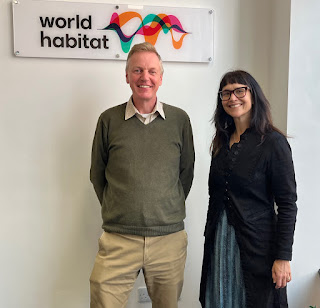Talking Local Government Homelessness with World Habitat
World Habitat
is a UK charity working across the world to “recognise and highlight innovative,
outstanding and sometimes revolutionary housing ideas, projects and programmes
from across the world”. They initiated
and work with 13 cities as part of the European End Street Homelessness
Campaign. The World
Habitat Awards “recognise innovative, outstanding and sometimes revolutionary
ideas projects and programs” in housing and homelessness response around the
world.
The team at World Habitat helped me tremendously in identifying
and connecting with homelessness teams working on innovative programs in many
different places. It was wonderful to meet up with CEO, David Ireland and Homelessness
project manager, Ella Hancock (virtually) in Leicester on World Homelessness Day, 10 October
2022.
Their knowledge across countries and sectors is broad – here
are some of the points that piqued my interest when we talked about local government
and homelessness.
Defining and measuring homelessness
- Having an
agreed definition of homelessness and expected outcomes is helpful.
It also helps you measure. The Centre for Homelessness
Impact has done significant work to define and measure homelessness,
focusing on prevention and if homelessness occurs ensuring it is rare,
brief and non-recurring. If all
these factors are tracking down, you can see progress.
- If you
can get multiple councils working to the same indicators and seeing
measurable outcomes you can make comparisons.
- Data and
info will inform responses. This is
vital to fully understand the problem and make cases for interventions.
When you have info you shift from thinking about whether you should do
something to actually doing it.
Homelessness requires a joint response.
- Rough
sleeping is the tip of the iceberg. It’s not
enough to focus on rough sleeping, cities need to look at solving all the
problems that surround and lead to homelessness. These might be housing or
health related, or the requirements of people coming out of hospitals or
the criminal justice system.
- Different
parts of government (not just those with the homelessness portfolio) can
have an impact on different
elements of homelessness. If everyone is working to the same plan it makes
it much easier.
What can local government do?
- Be a
strategic lead. Local Government
have many different powers and responsibilities and someone needs to take
the lead.
- Councils
have better levers than many others to bring in funding and mobilise
people. Local government can lead by setting strategy - one thing that
everyone is working towards. Councils without a strategy struggle.
- Don't
just prioritise homelessness when in a crisis. A lot of councils don't see homelessness as a problem because they
have relatively few rough sleepers, but that does not mean other types of
homelessness don't exist.
- Prevention stops you getting to crisis point.
Mobilising and encouraging action
- Mayors
definitely have a role to play in
mobilising action - you can see this in places like Manchester where you
have a mayor who has been elected with a strong manifesto on homelessness.
- Personalise
homelessness - tell stories.
They are good at this in the US (see Community
Solutions). Bring out the story
of a person. The moment you humanise it. When a person sees a human face,
you change something.
Video about World Habitat: https://world-habitat.org/about-world-habitat/who-we-are/
Defining a shared vision of an end to homelessness: https://world-habitat.org/news/our-blog/defining-a-shared-vision-of-an-end-to-homelessness/
Below - with David Ireland, CEO of World Habitat
The screenshot below outlines World Habitat's focus and is from their 2021-22 Annual Report (p.51)





Comments
Post a Comment